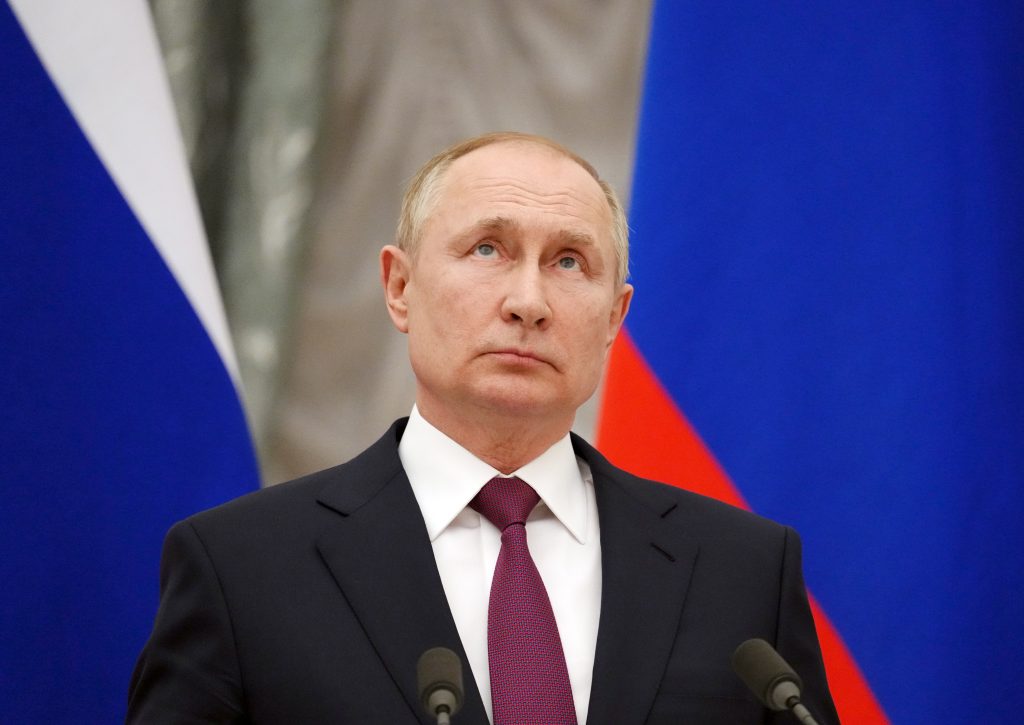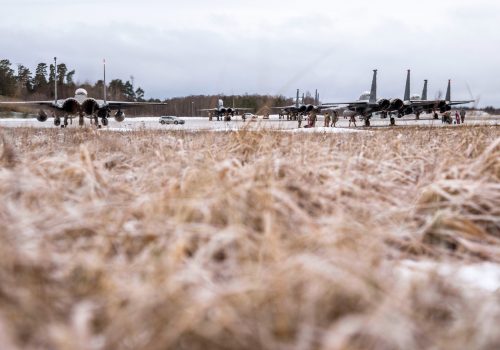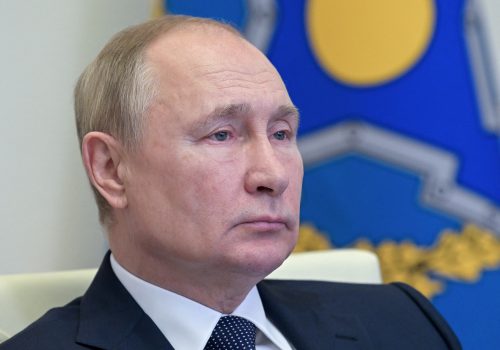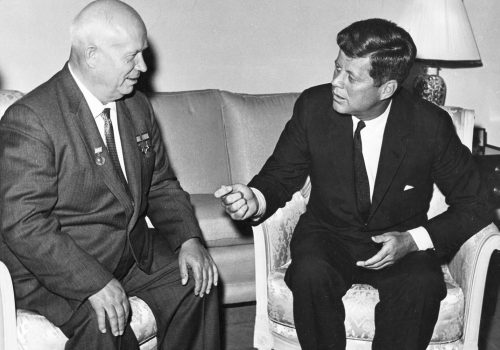With alarms sounding much like Paul Revere alerting the colonists in 1775 that the Red Coats were coming, the White House is warning that war in Ukraine is imminent. Should an attack not come, the White House and NATO will deservedly take credit for deterring conflict by taking the strongest possible diplomatic stands and remaining unified throughout this crisis.
However, another reason may have carried greater weight—one that so far has not been properly considered in the West.
Vladimir Putin faces a Ukrainian paradox he cannot resolve by unleashing his army on the former Soviet republic. By conflating three vital Russian national-security interests into four demands, Putin created internal contradictions and conflicts that will make a military intervention in Ukraine as disastrous for Russia as the invasion of Afghanistan was for the Soviet Union.
What does Putin want? A security framework in Europe favorable to Russia based on pre-1997 conditions, in which NATO agrees to cease all expansion and Ukraine remains well disposed to Moscow. Why, then, did he not say that and thus avoid antagonizing NATO and uniting it in powerful opposition?
Instead, Putin issued unacceptable demands, including a requirement that NATO reposition its forces and weapons systems away from eastern members of the Alliance who joined after 1997. He specified a legally binding, enforceable agreement that NATO will cease its “open door” policy and all further expansion. Putin also demanded that Ukraine never join NATO nor have nuclear weapons stationed on its territory
Had Putin looked closely at these demands, he would have found them riddled with enough contradictions to delight any confirmed Marxist or Leninist.
The demand for a pre-1997 security framework would significantly affect Russia as well. It had no forces in Ukraine or Georgia at that time. Would it withdraw its forces from those countries now? Kaliningrad, a Russian enclave on the Baltic Sea bordering Poland and Lithuania, would likewise be affected as Iskander and other more modern missile systems would have to go under the terms of Russia’s proposed treaty with NATO.
As for NATO, Putin, trained as a lawyer, knows that no legal agreement will guarantee NATO foregoing expansion. The litany of abrogated US-USSR-Russian Federation treaties drives this home. The Anti-Ballistic Missile, Open Skies, and Intermediate Nuclear Forces treaties are no longer in force. This pursuit of an unenforceable agreement is a contradiction. What is Putin’s solution? Someone should ask.
A backfiring invasion
In regard to Ukraine, Putin also knows that an armed attack or aggressive use of force will make any chance of his achieving both his priorities even less likely than landing an astronaut on the sun. He also knows that the costs to Russia and to him personally will be high and possibly unaffordable. Sanctions and further isolation will hurt.
Going to war, no matter the scope, or using cyber and influence operations to cripple Ukraine, will absolutely foreclose any chance for even part of Putin’s demands being considered by NATO. The Alliance’s response to a major attack will make the actions it took after Russia’s 2014 Crimean annexation appear anemic. It will expand its military capability and the number of forces stationed in Europe—exactly the opposite of Putin’s intent. NATO members will develop and deploy more advanced weapons, including new classes of missiles with low-yield nuclear warheads.
NATO badly needs a new strategic framework (here, ironically, Putin is right for the wrong reasons). If war breaks out in Ukraine, the Alliance will certainly move to a new framework incorporating some of the actions mentioned above and announce it during the Madrid summit in June—another outcome Putin won’t like one bit.
In an escalation, the West will impose sanctions more strictly and robustly than before. How much this will dent Russia’s economy or Putin’s inner circle is uncertain. But the Nord Stream 2 natural gas pipeline will almost certainly be cancelled, denting Russia’s energy sector. Whatever credibility Putin may have gained will be lost given the “big lie” of his assurances that force would not be used in Ukraine. Of course, Russia will have accused the West of provoking violence requiring an “appropriate response.”
If a subsequent occupation of Ukraine were required, even of just a portion of the country, body bags could be flowing back to Russia. And what is Putin’s exit strategy? No such plan following a Russian attack is obvious for Moscow other than a prolonged twenty-first century version of the Cold War, but one in which Moscow uses substantial force resulting in even greater isolation. And that could doom Putin’s rule in a way similar to how Soviet Premier Nikita Khrushchev got fired two years after the October 1962 Cuban Missile Crisis.
An advantageous stalemate
The billion-ruble question is: How does this crisis end? Speculation over invasion scenarios has ranged from a massive, overwhelming air, sea, and land assault to a mix of cyber, special-forces, and influence-based non-kinetic operations. Should Putin not grasp the predicament he has imposed on himself, a limited move in the Donbas or seizing a land bridge into Crimea would seem to be the lowest-risk and lowest-cost option. He could then judge how NATO chooses to respond and wait. But Putin would almost certainly suffer the same consequences as if he took Kyiv and occupied much of the country.
Assuming there is no military action, Putin has two choices.
First, he can prolong the crisis and maintain the buildup on the Ukrainian border. That would be expensive and wear down his forces. Staying on constant alert takes a toll on people and pocketbooks.
Or Putin could terminate the exercise with Belarus on February 20 as scheduled, draw his troops back from the Ukrainian border, claim victory, and continue to push for negotiations—arguing that as the West wrongly predicted an attack, it continues to fail to recognize Russian security interests and needs.
Russia will no doubt continue political and psychological pressure on Ukrainian President Volodymyr Zelenskyy to make concessions, either to accept the Minsk 2 agreement (despite its grant of semi-autonomy to the Donbas) or to suspend any request for NATO membership. And Russian “active measures,” such as disinformation campaigns, will continue to target Ukraine with the aim of eroding Zelenskyy’s standing and NATO solidarity by claiming “hysteria” over an invasion that never occurred.
This scenario suits Putin’s interests far better than an uncertain military adventure, which is why he will choose it—and not because of anything uttered from a White House podium, no matter how much credit the administration will take for deterring a war.
Harlan Ullman is an Atlantic Council senior advisor and UPI’s Arnaud deBorchgrave Distinguished Columnist. His latest book is The Fifth Horseman and the New MAD: How Massive Attacks of Disruption Became the Looming Danger to a Divided Nature and the World at Large.
Further reading
Sun, Jan 30, 2022
The Russia crisis has exposed why NATO needs a strategy shift
New Atlanticist By Harlan Ullman
With Russia threatening Ukraine, NATO's new strategy already seems dated, as it lacks a comprehensive counter-gray area/hybrid-war approach, among other shortcomings.
Mon, Jan 10, 2022
The US and NATO must attack Vladimir Putin’s intimidation strategy
UkraineAlert By
The current US approach to the crisis with Russia is predictable and conventional. The principle author of the "shock and awe" doctrine, Harlan Ullman, believes it is time to turn Putin's intimidation tactics against him.
Wed, Feb 9, 2022
Engagement Reframed #2: Seize the opportunity to rethink European security
Engagement Reframed By Emma Ashford
What is the opportunity? The ongoing crisis over Ukraine poses an extraordinary challenge for US and NATO policymakers. In recent months, Russia has positioned increasing numbers of military personnel, heavy weapons, and materiel along the Russian border with Ukraine, as well as near the Ukrainian-Belorussian border. Thus far, the Russian approach suggests that the Kremlin […]
Image: Russian President Vladimir Putin looks up at a joint press conference with German Chancellor O. Scholz (SPD) after several hours of one-on-one talks in the Kremlin. (Photo by Kay Nietfeld/dpa via Reuters)



